|
|
|
Sort Order |
|
|
|
Items / Page
|
|
|
|
|
|
|
| Srl | Item |
| 1 |
ID:
160804
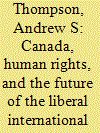

|
|
|
|
|
| Summary/Abstract |
Human rights—specifically international human rights law—have been central to the success of the liberal international order. But since the founding of the United Nations (UN), Canada has had a complicated relationship with international human rights law. This article provides a survey of sixty years of Canadian human rights diplomacy at the UN Commission on Human Rights, from its establishment in 1946 to its dissolution in 2006. During this period, there were moments when Canada did champion new international law, and did so courageously. Yet there were others, such as during negotiations to recognize and codify the rights of Indigenous peoples, when it stood in the way of progress. But the international order that has served Canada so well since the end of the Second World War is under threat, due to a combination of shifts in the global balance of power, and critical challenges such as climate change. If it is to survive into the twenty-first century, advanced democracies such as Canada will need to lead in the development and enforcement of international human rights law, a role that governments in Ottawa have at various times been reluctant to play.
|
|
|
|
|
|
|
|
|
|
|
|
|
|
|
|
| 2 |
ID:
160806
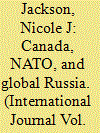

|
|
|
|
|
| Summary/Abstract |
Today Russia poses significant challenges that require sophisticated responses from both Canada and the North Atlantic Treaty Organization (NATO), yet more research is needed on almost all aspects of policy development. Academic experts on NATO and Russia could contribute significantly to this process. To this end, collaboration and engagement among those experts with each other’s literature would be highly beneficial. Appropriate methodologies must be developed to answer questions about Russia’s specific intentions, test the assumptions upon which NATO and Canada’s policies are founded, and discover and respond to the root causes of Russia’s discontent. Policy options should be based on detailed knowledge of global security dynamics, as well as high-quality analysis about Russia’s rhetoric and its varied use of hard, soft, and sharp soft power in regional and global cases. A research network on these topics could help decision-makers respond to these complex developments by approaching them through “the eyes of our adversaries,” clarifying the big picture of hybrid warfare and also the micro-level details.
|
|
|
|
|
|
|
|
|
|
|
|
|
|
|
|
| 3 |
ID:
160800
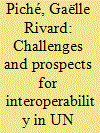

|
|
|
|
|
| Summary/Abstract |
Interoperability is central to UN peace operations. These operations are civilian-led enterprises that pursue complex objectives, which often can only be achieved through the close collaboration of civilian, police, and military actors. As a result, coordination and interoperability between civilian and uniformed personnel in peace operations is not only desirable but often necessary to the success of these missions. Yet, interoperability is not a given. Peace operations face important challenges that can undermine the ability of their different components to work effectively together towards common objectives. Based on observations made during field research in Haiti and time spent at the UN headquarters in New York City, this essay discusses the challenges faced by peace operations in regard to interoperability, factors that facilitate interoperability, and implications for Canada’s announced return to peacekeeping.
|
|
|
|
|
|
|
|
|
|
|
|
|
|
|
|
| 4 |
ID:
160805
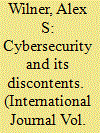

|
|
|
|
|
| Summary/Abstract |
The future of cybersecurity is in flux. Artificial intelligence challenges existing notions of security, human rights, and governance. Digital misinformation campaigns leverage fabrications and mistruths for political and geostrategic gain. And the Internet of Things—a digital landscape in which billions of wireless objects from smart fridges to smart cars are tethered together—provides new means to distribute and conduct cyberattacks. As technological developments alter the way we think about cybersecurity, they will likewise broaden the way governments and societies will have to learn to respond. This policy brief discusses the emerging landscape of cybersecurity in Canada and abroad, with the intent of informing public debate and discourse on emerging cyber challenges and opportunities.
|
|
|
|
|
|
|
|
|
|
|
|
|
|
|
|
| 5 |
ID:
160797
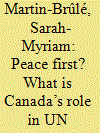

|
|
|
|
|
| Summary/Abstract |
In the wake of the Canadian government’s pledge for a renewed role at the United Nations (UN) notably by reengaging in peacekeeping activities, this special issue focuses on Canada’s added value to peace operations. Our aim is to identify the goals, challenges, and stakes for Canada’s reengagement in peace operations as a central component of foreign and defence policy. One of the first questions to ask is how can Canada contribute to peace operations which are now characterized by more complex security environments, in a way that is consistent with its interests, resources, and capacity? The second question relates to Canada’s engagement in peace missions in the context of a continuously evolving technological landscape. Finally, we address defence planning, equipping the Canadian Armed Forces, and managing personnel, as they relate to UN operations. The time is ripe to revitalize the debate on peace operations and analyze Canada’s capacity in this area.
|
|
|
|
|
|
|
|
|
|
|
|
|
|
|
|
| 6 |
ID:
160802
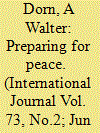

|
|
|
|
|
| Summary/Abstract |
During the Harper years (2006–2015), Canada significantly reduced the training, preparation, and deployment of military personnel for United Nations (UN) peacekeeping. Now, despite the Trudeau government’s pledge to lead an international peacekeeping training effort, Canada’s capabilities have increased only marginally. A survey of the curricula in the country’s training institutions shows that the military provides less than a quarter of the peacekeeping training activities that it provided in 2005. The primary cause of these reductions was the central focus on the North Atlantic Treaty Organization’s Afghanistan operation and several lingering myths about peacekeeping, common to many Western militaries. As the Trudeau government has committed to reengaging Canada in UN operations, these misperceptions must be addressed, and a renewed training and education initiative is necessary. This paper describes the challenges of modern peace operations, addresses the limiting myths surrounding peacekeeping training, and makes recommendations so that military personnel in Canada and other nations can once again be prepared for peace.
|
|
|
|
|
|
|
|
|
|
|
|
|
|
|
|
| 7 |
ID:
160798
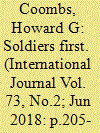

|
|
|
|
|
| Summary/Abstract |
The Canadian Army has historically adopted a paradigm of preparing for peace operations by training and educating both soldiers and leaders to be capable of general-purpose combat. This paradigm of “soldiers first” has not been without its flaws, particularly when the security environment, the operational mandate, and mission preparation became unaligned. Consequently, as we move forward into the peace activities of the twenty-first century, where Canadian soldiers will be committed to operations in complex regions like Africa and the Middle East, it will be necessary to identify and institutionalize the lessons of the past in order to ensure that the model of “soldiers first” can be adapted to the varied challenges of the contemporary and future security environment through a holistic application of specialized training, leader education, and institutional support.
|
|
|
|
|
|
|
|
|
|
|
|
|
|
|
|
| 8 |
ID:
160799


|
|
|
|
|
| Summary/Abstract |
Since the release of the 2015 United Nations Peacekeeping Missions Military Special Forces Manual, there has been surprisingly little scholarly attention devoted to it. Indeed, much of the recent literature on the topic of special operations forces (SOF) is descriptive, sensationalized, or simply boosting the image of SOF as the proverbial “easy button” for decision-makers. This article seeks to critically engage with the 2015 United Nations manual on SOF through the framework of specialized generalists, boundary spanning, and military autonomy.1 This paper will then continue the argument that SOF has a role in peace operations, albeit a limited one. Finally, it will conclude with some recommendations for how these findings can inform Canada’s employment of SOF in the future. Indeed, given that Canada is a relative newcomer to the “global SOF network,”2 such critical inquiry is warranted.
|
|
|
|
|
|
|
|
|
|
|
|
|
|
|
|
| 9 |
ID:
160803
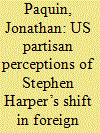

|
|
|
|
|
| Summary/Abstract |
While Stephen Harper’s foreign policy sparked heated debates during his entire tenure as prime minister, these debates were mainly confined to Canadian foreign policy circles. Little attention was paid to allies’ perceptions of these developments and, more specifically, to the perception of the United States, Canada’s main economic and security partner. How did the Bush and Obama administrations perceive these changes? Were they seen as a break from Canada’s past? Did Harper’s handling of foreign policy alter White House calculations with respect to Canada? Based on a series of semi-structured interviews conducted in Washington DC with executive officials a few months prior to the end of the Harper era in 2015, this essay shows that despite a widespread perception in Washington that Canada’s foreign policy approach had changed under Harper, partisanship was the main dividing line in terms of how this approach was perceived and assessed.
|
|
|
|
|
|
|
|
|
|
|
|
|
|
|
|
|
|
|
|
|